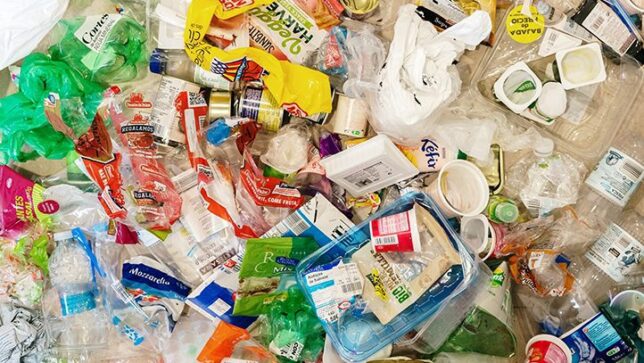A group of health advocates, including Center for Food Safety, and represented by Earthjustice sued the U.S. Food and Drug Administration in late December to force the agency to reevaluate its decades-old authorizations for the use of certain phthalates in food packaging and food production materials.

Phthalates are a group of hormone-disrupting chemicals that leach into food from these food-contact materials. The FDA’s authorizations are based on safety assessments that are at least forty years old, and the agency has refused advocates’ calls to update them.
“The FDA’s failure to act on phthalates is a dereliction of its duty to protect public health,” said Kristina Sinclair, staff attorney at the Center for Food Safety. “These toxic, hormone-disrupting chemicals are linked to birth defects, infertility, and harm to children’s brain development. By ignoring decades of science, the FDA is allowing industry to profit while endangering millions of people. It’s time for the agency to prioritize safety over corporate interests.”
Members of the coalition that filed the lawsuit first asked the FDA to revoke these authorizations in 2016 based on decades of scientific evidence linking phthalates to birth defects, infertility, preterm birth, harm to children’s brain development, and other serious health harms. FDA failed to respond for six years and ultimately rejected the coalition’s demand for the FDA to reevaluate the safety of using phthalates in food-contact materials. After years of inaction, the advocates sued the FDA in 2021, forcing the agency to respond. In 2022, the FDA denied the petition. Despite the advocates’ appeal to reconsider, the FDA upheld its decision in October 2024, allowing phthalate contamination of our food to continue.
Seven years ago, the Consumer Product Safety Commission banned many phthalates from children’s toys based on their health risks, while finding that most phthalate exposure comes from food. Yet the FDA, which authorizes the food-contact uses of phthalates that contaminate our food supply, has failed to take action.
Earthjustice filed the lawsuit in the U.S. Court of Appeals for the D.C. Circuit on behalf of Alaska Community Action on Toxics, Breast Cancer Prevention Partners, Center for Environmental Health, Center for Food Safety, Center for Science in the Public Interest, Defend Our Health, Environmental Defense Fund, and the Learning Disabilities Association of Illinois.
“The FDA is knowingly putting millions of people in the U.S. at risk of life-altering health problems by continuing to green-light uses of phthalates that contaminate our food,” said Earthjustice Attorney Katherine O’Brien. “FDA’s decision defies decades of science and the agency’s core purpose of keeping the food supply safe.”
“The Learning Disabilities Association of Illinois believes it is critical to do everything possible to prevent neurological harm to children. That neurological harm can result in lifelong disabilities,” said Beverley Johns, President of the Learning Disabilities Association (LDA) of Illinois.
“I am concerned about the harm caused by phthalates to our children and future generations,” said Pamela Miller, founder and executive director of Alaska Community Action on Toxics. “Indigenous People living in rural communities in Alaska have few fresh food options available. Reliance on more packaged and processed foods is a necessity and as a result, they face an inequitable burden of exposure to phthalates and other toxic chemicals. It is the FDA’s job to protect our health and well-being and we will hold them accountable.”
“CEH is deeply disappointed with FDA’s continued failure to safeguard public health. For years we have asked the FDA to ban phthalates in food packaging and food-production materials. Research clearly shows phthalates migrate into food, and the harmful effects of these chemicals on vulnerable populations like babies and children are concerning,” said Shakoora Azimi-Gaylon, Director of Toxic Exposures and Pollution Prevention, Center for Environmental Health.
“It is unconscionable that despite research dating back to the 1970s showing the dangers of phthalates, the FDA has continued to allow these toxic chemicals in food processing equipment and in packaging,” said Emily Carey Perez de Alejo, president and chief executive officer of Defend Our Health. “While some states have already taken action to ban phthalates from food packaging and industry leaders have started taking steps to clean-up their production lines, the FDA has refused to reevaluate the safety of phthalate uses it approved decades ago. It’s long past time for the agency to protect the young children and people of color who are disproportionately exposed to phthalates.”
“We will not disregard the very serious negative impacts phthalates have on pregnancy, child growth and development,” said Maria Doa, Senior Director for Chemicals Policy at Environmental Defense Fund. “FDA has decided to ignore years of research and failed to take action to protect our health from these chemicals widely known to cause harm, allowing business as usual for companies who profit from their use.”
“The harms from phthalates leaching into our foods are serious, and most importantly, they are preventable,” said CSPI President Dr. Peter G. Lurie. “The FDA has failed to consider decades of accumulating scientific evidence in the record that the continued use of phthalates is unsafe, and the agency also failed to fully consider the cumulative effects of exposure to multiple phthalates, as the law requires.”
“The FDA’s determination that phthalates are safe is based on antiquated science and fails to protect the public from the range of negative health impacts current scientific studies have shown, including links to breast cancer,” said Nancy Buermeyer, Director of Program and Policy for Breast Cancer Prevention Partners. “It is well past time the FDA did its job and stopped the use of these harmful chemicals in food packaging and processing materials.”



















